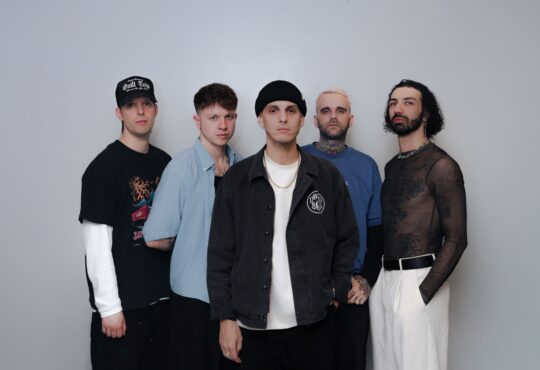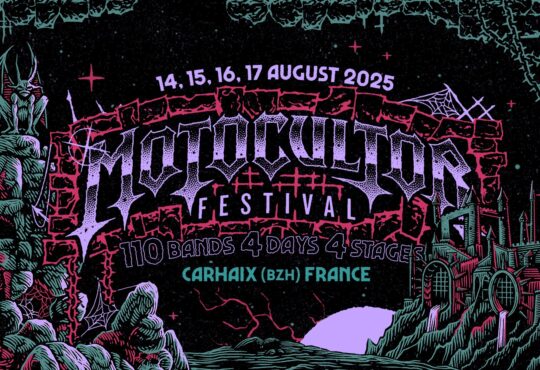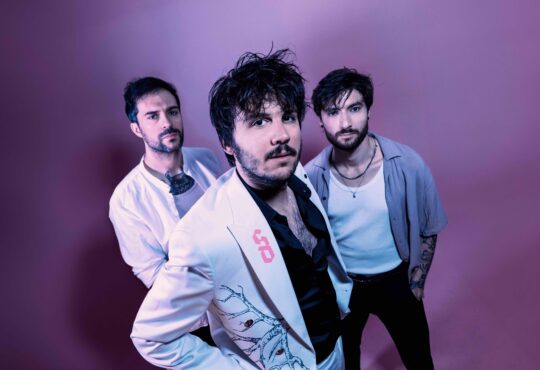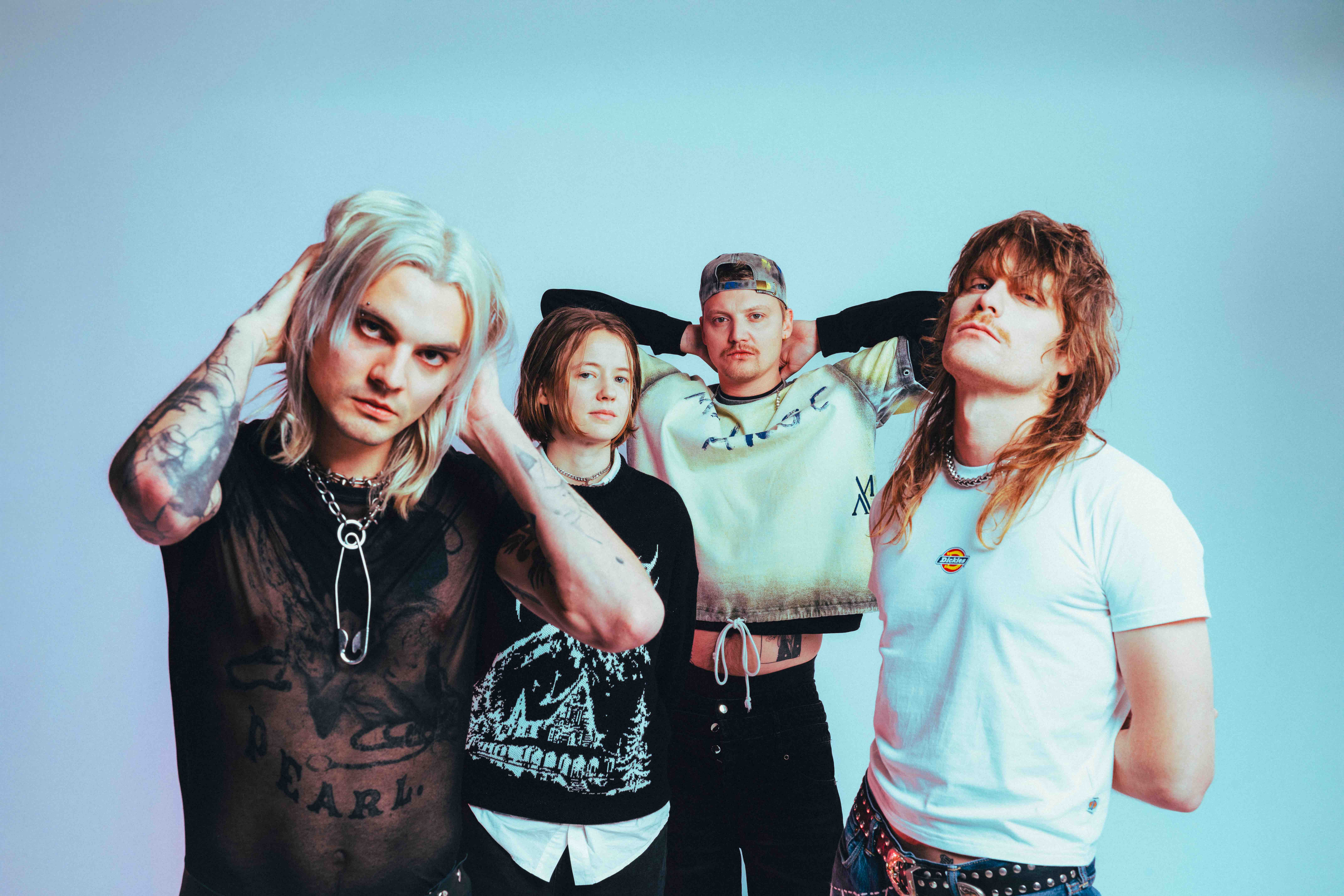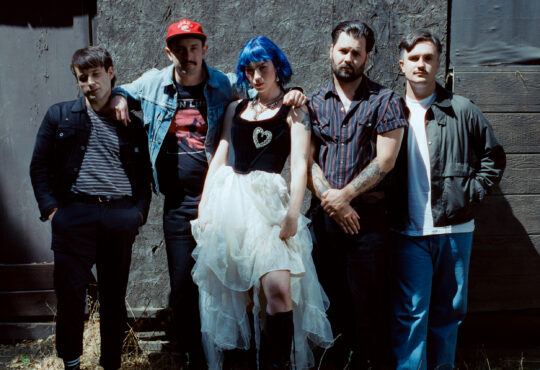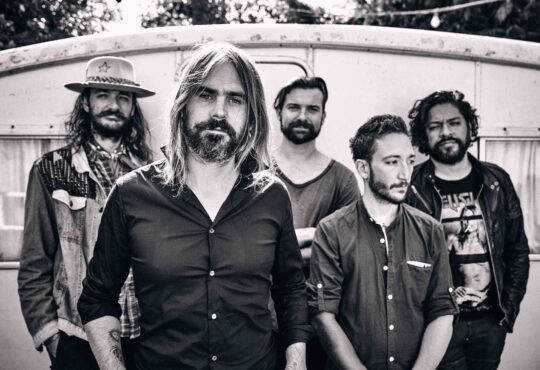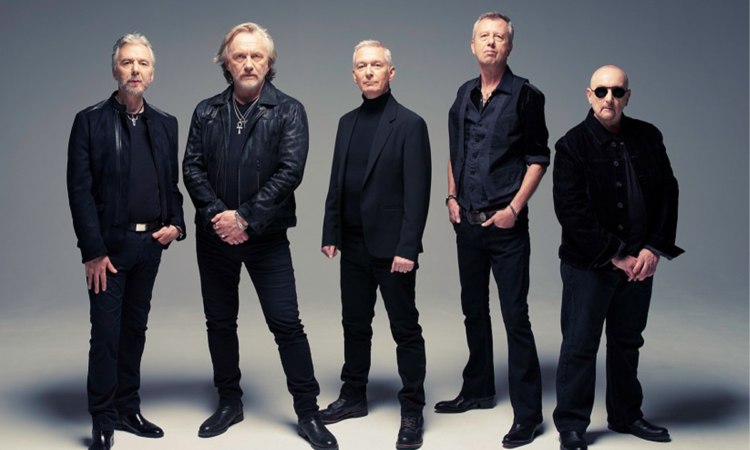
Born in lockdown, released after lockdown. Thunder returns with a brand new record and we discussed about Dopamine with Luke Morley and Danny Bowes about it!
Hi Luke and Danny, how are you?
Luke Morley (guitars): Good, yeah. It’s nice after two years of not going anywhere. It’s nice to actually come here and talk about the album rather than do it via a phone or Zoom. It’s good to be here.
Did you get used to do it via Zoom?
Luke: It’s kind of still weird. I mean, obviously we use it all the time, but, we have to. But it’s still a bit weird. You have to wait for somebody to speak and then they get their little box around them. And it’s really funny. I do a family Zoom every week as my mother lives in Italy. I live in the south of England but there’s also my sister, and they both talk too much. And they just talk over each other which on Zoom. That drives me insane.
Danny Bowes (vocals): Yeah, it’s a strange thing, but it’s incredible just how normalized it’s become. It’s normal now, everybody does it. Whereas a video conference meeting was probably just in business before COVID, so. It’s just another way of communicating. I don’t think it’s as good as face to face, but.
So you’re already back with a new record more than a year after All The Right Noises (2021). How natural was it to head back into the studio?
Luke: It was good because it saved us all going insane, which is good. And it still felt like we were, we had to kind of like everybody is faced with the thing. Okay, right. “Well, we can’t do this for God knows how long“. What we’re going to do. Well, we want to use the time. And for me, it was very simple, was like: “okay, well, I’m just going to write” because that’s what I do. And, and as we are sort of acquiring more and more material, it’s like: “okay, well maybe we should do some recording“and then the tour got moved. And so it was a weird time because things are constantly moving. Just you kind of make a panic. “Okay, we can do that” then: “oh, no, we can’t do that”. The last album was postponed, so.
Danny: We sat on All The Right Noises for a year, between finishing it and releasing it. And obviously during that time we didn’t get to play. So obviously we had a lot of time to write songs, which meant that within two months of All The Right Noises being released, we were back in the studio. So for us it didn’t feel like it was too quick because we’d had a long time to prepare for it. The problem was, and the weird thing was that we never got to play All The Right Noises live. Okay that sped everything up. But it made us all the more determined to get back into the studio because it’s just pure frustration, really. If you make records and you can’t play live and you don’t get to play live, then you just have to make more records.
But you could have just wait and played the latest/previous record right?
Danny: Yeah, totally.
Luke: We’re over 60 and time is precious. So, and I think it’s really important, all of us, want to kind of keep moving forward. So the thing of sitting on your ass and doing nothing is very dangerous for anybody, actually. And, you gotta feel like you have such purpose and that you’re moving forwards. And I think all of us wanted to kind of get on with it. So for us, it was easy because you couldn’t fucking go anywhere. (laughs) So the other thing, it’s like the choice of sitting around in the house doing nothing or how much gardening can you do? Or, how much decorating can you do? As little as possible in my case. All of those things and then you think: “well, I’ve got to get back to work”. So it’s a matter of focus.

Your new album is titled Dopamine. It refers to the sense “validation” given by Social Media activity. How did you come up with this topic as a guideline? Are you Social Media addicts as well?
Luke: Okay, the first part of the question. The question to come out whenever you make an album, the next thing, once you’ve kind of finished it, is: “what the fuck are we going to call it?” that’s the next problem.
Danny: For us, it’s more about making the music first. And then finding a title and a way to kind of hook it all together rather than the other way around.
Luke: So unless something really jumps out, then obviously the thought process that goes on and obviously lots of the subject matter of Dopamine is about the world as it is or has been in the last couple of years. And obviously the thing about Social Media and the people living their lives via this small device that was kind of, that’s a massive part of the world now. Also the other thing to consider is when we have to kind of think of a visual way of manifesting that or creating it visually. And so the dopamine thing for me was kind of once the word kind of occurred.
I read an article in the newspaper, which is an American psychologist, and she was saying that we’re all dopamine addicts because we’re doing this all the time, because we want validation, want people to like us, and it makes us feel worthwhile. So I think “dopamine” was a really good word. And so that was it, really. And then the idea of getting the two girls in the bathroom and the unicorn coming out the toilet and I miss it because the journey focus there. There’s all this going on around them when they don’t see it. So it was fairly straight once, you know, once we had the word, then it was pretty easy with.
Danny: But as far as social media is concerned, I mean, I do find it slightly concerning that there are people, especially younger people who’ve grown up, where the first thing they do in the mornings reach for their phone to see if they’ve got any likes on anything they’ve done. So that they’ve become more interesting overnight as a result of what they’ve done on social media. For me, it’s I’m of an age where that it doesn’t apply it. I don’t feel that way. I don’t believe anybody’s interested in what I had for breakfast, and I’m not interested in what anybody else had for breakfast either. (laughs) So for me, it doesn’t really compute in any way. I see social media is a valuable tool, a way to engage with your audience and to let them know about the things that you’re doing.
Luke: A lot of it is very mundane. “Guess what I did today?”. I spoke to three people and I mean, who gives a fuck? Life is too short. Everybody’s got enough mundane in their own life. You don’t really want to spend your life reading it.
Danny: I think the problem is that’s also very divisive. So I think a lot of people lie. I think a lot of people feel that their life is not as interesting as everybody else’s and then they feel inadequate as a result. And I think that’s very dangerous. That’s why a lot of people have struggled with the mental health, struggle with self-worth, because everybody else’s lives appear to be more interesting than their own. But they don’t know if these lives are that interesting. They’re just not.
How does it connect to your album, the music apart from this cover?
Luke: Okay. It doesn’t maybe connect directly to any of the songs, although it’s another kind of manifestation of what’s going on in the world of the moment. The main theme that runs through the album, I think, is one about isolation, being removed.
Danny: The consequences of that self-examination.
Luke: Thing about lockdown and COVID and everybody’s life being very small again was a maybe they were thinking more about the realities of life because it’s very easy to kind of get wound up because of all of these things and think about everything else is going on out there. But when you can’t go anywhere or do anything or meet anybody, then it makes you more inward. So I guess that’s the main theme of the album, and that’s there in songs like “One Day We’ll Be Free Again”, of course “Is Anybody Out There?”.
Danny: “Dancing In The Sunshine”. We’re emerging from something that’s been awful. Now we’re going to have a great time.
Luke: Positive takes on it as well, but positive reinforcement, I think that’s the thing that runs through.
But was it inevitable to use what we lived for two years as a main source for this record? Because some bands will do it, obviously, but others will go on with concepts and others just use something else.
Danny: Sure. I suppose it’s how you feel about it, but you write about what you feel, don’t you?
Luke: Yeah. I think the problem is that you can’t… any kind of creative writing, right? Whether it’s songs, books, film, whatever has to be for it to be convincing, for it to be able to reach people, for people to be able to relate to it, I think has to be genuine. You know, like, okay, we are a rock band. But we are realistically in our sixties, we can’t write songs about driving fast cars and chasing girls. We could, but it wouldn’t be very convincing because that’s not what we do anymore. We did once and it was fucking great. But now we’re older. Life’s changed. And I think to try and still kind of. write about that. It feels like that’s all been exhausted. I mean, I know some bands are our age and even older still do that. But it wouldn’t feel, it’ll sound pathetic about an old man writing songs about a young girl’s ass. (laughs) I think you’ve got to be honest. You have to be honest with your audience and with yourself first and with your audience. And, also our audience has got older with us. So they hopefully can relate to our take on or have you on the world, by the way, who knows?
So the album starts with the “The Western Sky”, a pretty strong track for a bit for an opening track. So you also made a great video for it. How does this track reflect this dopamine?
Luke: It doesn’t. (laughs) It’s one of the few it’s a bit misleading maybe in terms of the fact it was the reason it was the first song that was released was we just thought it was a really exciting bit of rock and roll. So there wasn’t any a great conceptual thinking about it. But it’s about for ten years or so or apart from the last couple of years, we do this annual bike trip for a children’s charity where we go to various parts of the United States or Canada and Danny and Ben from the band ride motorcycles. It’s basically a motorcycle ride and scrape race of £250,000 over the last ten years. So the song is kind of loosely about that and driving through these kind of strange places like Utah and, you know, Idaho, places we wouldn’t normally kind of choose to go. But this was quite a cool about this trip, is that you see all this stuff and you’ve got this really strange little kind of one horse towns where there’s one bar and the guy in there has got one tooth. This is kind of a bit of that going on, and it’s the feeling of, heading West. This is a bit of the old pioneer spirit of the 19th century when people were over there and go West, young man and all that stuff. So it’s got fuck all to do with it. (laughs)
Danny: You know, we could tell you a story about how the motorcycle driver is, rider is fleeing COVID for the see, but that would be a line.
So why did you choose this one as the first single?
Luke: Because musically we felt like we felt it was it was it was very positive and energetic.
Danny: And I think a good bit of rock and roll was like a declaration of intent, really. You want people to get a feel for what the album is going to contain. So you can either go one of two ways. You can say this come out with something really strong, very rock and roll, or maybe go completely off the wall and make people cry. We just felt like “The Western Sky” was a good opener.
So there’s also the second single, “Dancing In The Sunshine”. Weren’t you looking for the opposite feeling or situation regarding this validation?
Luke: During the process of writing the album and particularly during lockdown a bit, I do remember the day I wrote the song. I wrote the song. all very quickly. It was a nice sunny day. And I thought, wouldn’t it be fantastic to get everybody around in the garden drinking beer and turn the music up. So it was a kind of product of lockdown. But like I said, on the positive, looking at it from a positive point of view.
So it’s more about some twists around this validation, that you can reflect through other subjects.
Danny: I think it kind of weaves his way in and out of some of the songs and the lyrical content.
Luke: Everything is, this varies because you can look at one thing from lots of different angles. It’s like interpretation. Yeah, well hopefully what the album does.
This is your first double album. Many bands and artists released this kind of effort in the past few years. Would you say it’s something to experiment as a band once in your career?
Luke: It’s strange because it evolved naturally. We didn’t set out, we didn’t say what we didn’t like. It wasn’t like that. Because of everything’s initially governed by the writing process and but we ended up recording 20 songs. During the process of the writing and recording, there was a point where Danny and I had a conversation that was like, “well, it’s a lot of good songs I mean they might be a double album“, but then there’s a lot of nervousness about because people don’t make double albums, right? But then if you look at the era we come from, you look at the the bands that we like when we were growing up and we were teenagers playing in bands Led Zeppelin, The Who, The Rolling Stones, lots of it. They all kind of made double albums.
So why the fuck shouldn’t we make a double album? If the songs warrant it, we kind of obviously the most important thing for us was that the quality of the songs justified making it long. It’s not just making it long because we can, but just so you know, the hour and however long it is in total, that the music held the interest all the way through and was still balanced and was kind of deserved to be there, it was enough, good enough to warrant its place. And also we recorded 20 songs and we decided between us that 16 had to be on the record. They had to be heard. We all felt good about it and we didn’t want it to be indulgent. But, like I said, we don’t want 16 songs on a double album just because we could, but we wanted it to be of good musical value.
Danny: Normally we would record a bunch of tunes and then we would just say, okay, let’s just concentrate on the best 11 or 12, the ones that we think fit together well and make what we think is a balanced album. In this particular instance, we didn’t set out to do that, but we didn’t set out to make a double album either. We just set out to record a bunch of tunes and once we recorded them, then you have the inevitable conversation about, “okay, so which songs do we leave off?” if it’s going to be a single album. And then we were looking at a situation where we could be removing eight or nine of them and we couldn’t choose eight or nine. So we ended up having to settle for removing four because the other four had to be there.
Luke: And the other thing about that was that because there were some songs, there’s a few songs in the album maybe that we kind of maybe go off in slightly different musical directions. “Big Pink Supermoon” with a three minute saxophone solo which is “what?” for a Thunder song. But we felt it fit in and it was musically valid. We felt it was a really good piece of music. And “Just A Grifter”, which is a little acoustic song, with the accordion and fiddle, which we’ve never used before, but we felt it was a good song. We felt that when you held it up against all the other songs that fit it in, that kind of balance. So that was I thinking what it was really about. What’s the best record this can be? Not how long is it, but what’s the best record this could be. And that’s you know, it just so happened that that was 16 songs.
Danny: It’s like it’s almost like the double album kind of crept up on us and, it almost recorded itself. It’s very strange because we didn’t set out to do it. We didn’t make the decision. The decision kind of made itself.
Any double albums you are a fan of/ you care about?
Danny: Physical Graffiti (1975), the White Album by The Beatles.
Luke: Yeah. Physical Graffiti (1975), Quadrophenia (1973) (The Who). Songs in the Key of Life (1973) (Stevie Wonder). Oh, my God, so many!
Danny: Made in Japan (1972) (Deep Purple).
Luke: Because we come from an era where people were, when you book an album, it was an event. And lots of the bands that we like you didn’t really have any access to until you went to see them live. So a Zeppelin album was like a mystical gift from the Gods. It was like, “well, what is this shit?” And you go and you look at it and then you kind of work, try and work out what the cover was about. And there was a kind of lack of information. That information was the music that was a really cool thing. And now we live in a world where everything is fucking, you can find out everything. So there’s a sort of mystery to it, which was great. And I know it’s impossible to create that kind of mystery and level of enigma in the modern world just doesn’t exist. If we said to our record company, “no, we’re not do any interviews. Not doing any press” Like what? It just wouldn’t happen today. So double albums, it was a slightly magical thing for us and people of our age, maybe.
Danny: So it’s weird. It takes on a completely different meaning in people’s minds the moment you decide it’s going to be a double album, and I don’t know why that is, but it does. It suddenly means something different to people when you call it a double album. And I don’t know if it’s a good thing or a bad thing, but for us it felt like it needed to be a double album. The music strays into other areas. It goes it pushes at the sides of what we do. It’s not just like a straight ahead 11, 12 tracks of kind of rock music. It goes into different areas. And because of that, I think you need to create your freedom to do that. So it’s like chicken and egg. Was it a double album because we did that or did we do that and then call it a double album? It’s hard to define because we didn’t plan it. It’s just how it came about. So it does feel very organic, not only as a piece of music, but also as a concept.
Any surprises or unexpected things that the fans will hear soon?
Luke: If we told you that it wouldn’t be unexpected, would it? (laughs)
Danny: But there’s something regarding “I Don’t Believe The World”, a conspiracy theory song. Sam our piano player on the record. He played the very famous Rockfield Studios. The same one that Freddie Mercury used on Bohemian Rhapsody, and on so many classic records. This piano, it’s an incredible piano. And the studio bought it in 1975. Brand new. And the strings on this piano never been changed until the day we did this song, because Sam hit a note and the string broke. And when the string broke, everybody, he thought something had fallen off the walls. A very strange sound.
Luke: It’s not something you hear piano strings. Nobody breaks parts because it’s not a sound you hear. We were in the control room and it’s like it was a bit like a gunshot. It was a very odd set, but we all heard different things.
Danny: And once we got through to the end of the song, he said: “did something fall off the wall?“. And he said: “I thought I had a gun” and I thought I had been cough, and it was all these different things. And we were just sitting there wondering what it was. And we went in and looked at the piano with this broken string. And we phoned the studio manager and said: “we’ve broken the string on a piano“. And she said, “That’s Freddie‘s piano. You’ve broken it“. We said: “We’re really sorry“. She said: “we bought that piano in 1975 and we’ve never, ever changed the strings through“. “We’re really sorry, but we need to finish the song. Can we get another string?” And so we got this string. But the weird thing is the sound at the very beginning of the song, you hear the song kind of go, when it starts, that sound is the sound of the string breaking in reverse. That was slowed down. So we we just thought, well, it sounds cool. We’ll use it.
You will play at Hellfest in June. It will be your first appearance there. What did you hear about Hellfest ? What are your expectations towards your performance over there?
Luke: It’s the biggest rock festival in France. That’s very important. We’ve never played it before, so that’s important the first time. We really look forward to it. It’s great to have the opportunity to do it.
Danny: And we haven’t played a festival in France for over 20 years. So for us we think it’s a very big deal and we’re very, looking forward to it. It looks like it’s going to be a very, very, very enjoyable thing.
Luke: But we like big outdoor festivals. I mean, we love it. We do really enjoyed those kind of shows. So I look forward to that very much.
Danny: We’re coming for you Hellfest!
Website: thunderonline.com



